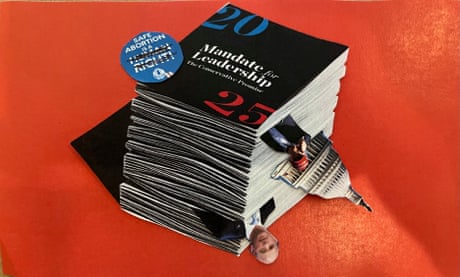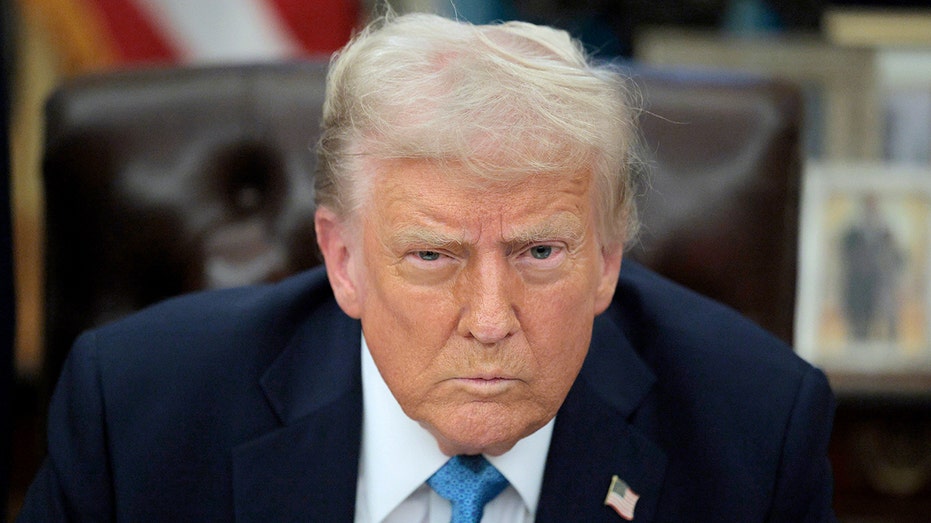- by foxnews
- 04 Feb 2025
I read the full 900-page Project 2025 manifesto - here’s why it matters
I read the full 900-page Project 2025 manifesto - here’s why it matters
- by theguardian
- 16 Sep 2024
- in politics

I printed out all 900-plus pages of Project 2025 in February on my home printer, stacking the unwieldy chapters on my desk. Bit by bit, each evening, I read my way through the plans that seek to dramatically alter each federal agency.
Most Americans who know about Project 2025 consume it in bite-size pieces, like Instagram infographics, or see the name on billboards. They hear politicians, like Vice-President Kamala Harris, mention it on stage - or former president Donald Trump disavow it in TV interviews. These attempt to neatly distill all the ways the document could upend the US government. For Democrats, Project 2025 has become a buzzword for the 2024 election, a shorthand way to warn voters what could be ahead if Trump wins again in November.
My own consumption of the project was not as piecemeal - I read the full conservative manifesto by the Heritage Foundation and its many rightwing allies. Here's what I learned from the document and all the controversy surrounding it.
Project 2025's policy guidebook, Mandate for Leadership, describes an America poisoned by "wokeness" and overtaken by lawlessness and chaos, where conservatives need to seize power immediately - and for as long as possible - to right a sinking ship.
The guide is just one part of the broader plan Project 2025 and Heritage had in mind to dismantle the government, recruit thousands of politically aligned people to staff an incoming Trump administration, and quickly guide the next president into the steps needed to accomplish their preferred policy changes.
Trump has claimed he does not know what it is or who is involved, though he does indeed know many of the people involved. Perhaps more importantly, his policy plans often align with what's in the project.
By seeking to influence Trump, the project - which counts more than 100 conservative groups as supporters and contributors - probably poisoned Heritage and its allies' chances of forming part of Trump's inner circle and potential next administration by claiming it could influence a man who hates to see himself as influenced by others. Other thinktanks that kept their hands clean of the power struggle could instead become more influential, though it would be difficult, or impossible, to staff thousands of political jobs with people who have no ties to Heritage or Project 2025.
In an ironic turn, given the toxicity of the project to voters, it could cost Trump the election in November.
Outside groups always hope to influence presidents. Heritage has put together and released a version of the Mandate for Leadership every four years since Ronald Reagan's first term. Why did this one catch such fire? For one, they wrote it all down and released it publicly, with a splashy online presence and media appearances. They also recruited tons of other conservative groups to sign on as allies. They publicly called it a plan for "institutionalizing Trumpism".
Democrats seized on it, seeking to tie Trump directly to the plan by plastering the project on billboards and mentioning it in speeches as much as possible. They have been successful - though the plan was released in 2023, the public's knowledge of it has increased dramatically in the last two months because of this negative attention.
Could the ideas in Project 2025 actually happen? Not all of them, and not overnight. But a movement amasses power that then can lead to massive social change piece by piece. Some of the plans, like dismantling the Department of Education, have been on conservative wishlists since the department began. That doesn't mean they couldn't happen - it just means there is an eventual tipping point where they could. Take the fall of Roe, for instance.
One way the plan seeks to create more tipping points is by adding in more political appointees, a change Trump has tried in the past in what's known as Schedule F. It would classify thousands more positions in the federal government as political instead of neutral career civil servants. And the recent US supreme court ruling that made accountability difficult if a president's official acts break the law certainly helps with amassing power in the executive branch, too.
As I have watched and covered the project and the backlash to it from Democrats and Trump's circle, it has become clear that few have read the document itself. It is at times less aggressive than its detractors would have you believe and at others far more wide-reaching and consequential than a simplistic infographic.
It doesn't say to defund social security, for instance, despite what some TikToks claim. But it does say a whole lot else that would affect the daily lives of people in the US and beyond.
Across multiple agencies, it would make access to abortion infinitely more difficult. It would change the name of the federal health and human services department to the "Department of Life". It would criminalize pornography. There would be mass deportations and curtailments of legal immigration programs, including Daca. It would dismantle the Department of Education.
Throughout the manifesto, authors also recommend ways to increase funding for religious organizations by giving them more access to government programs - largely through increased use of school vouchers that could go to religious schools or by modifying programs like Small Business Administration loans to make religious groups eligible for funding.
In some parts, the project takes a more explicit Christian worldview. In the chapter about the Department of Labor, the manifesto suggests a communal day of rest for society because "God ordained the Sabbath as a day of rest". One way to enforce this idea would be for Congress to require paid time-and-a-half for anyone who works on Sundays, which the project calls the default day of Sabbath "except for employers with a sincere religious observance of a Sabbath at a different time".
In nearly all chapters, there is a mention of driving out any forces that seek to increase diversity in the federal government. And whenever LGBTQ+ rights are mentioned, it is to say there should be fewer of them.
Project 2025 is also steeped in the culture wars: the document characterizes so many elements of governance as woke - the woke treasury department, woke weather reports - that the term is rendered meaningless. It also describes the country as run by "elites" - though not, apparently, the elites that run heavyweight Washington thinktanks.
Trump's policy positions are typically much less detailed than what's in Project 2025. We have at times referred to Project 2025 as the meat on the bones of a Trump presidency. To figure out where Trump and the project's policy goals align, I also looked up what Trump has said - or not said - on the issues the project covers.
Schedule F, the wonkily named plan to create a government more beholden to its executive, is perhaps the biggest change that the project seeks, and it's one Trump is aligned on.
In each agency chapter, there are suggestions for how more non-partisan, civic employees in the federal government could be turned into political appointees who would be beholden to the Trump agenda and less likely to push back on policy changes.
In that sense, we shouldn't think of Project 2025 as solely aimed at Trump: it is instead a vision for conservatives for Trump and far beyond, a rightwing wishlist aimed at generational change in how the government operates and the chief executive's role within it.
I will use what the project suggests for the US census - the huge count that the government carries out every 10 years - as an example.
The census helps decide how federal resources should be allocated to communities, but, for our purposes here, it's most relevant that census data is used to decide how to divvy up seats in the US House and make electoral maps during decennial redistricting done by states. The census can alter the balance of power in statehouses and in Congress.
Given its influence, the project suggests an incoming conservative president needs to install more political appointees to the census bureau and ensure ideologically aligned career employees are "immediately put in place to execute a conservative agenda". The next census isn't until 2030, but plans for it are already under way.
That conservative agenda includes adding a citizenship question, something Trump tried to do for the 2020 census but was blocked by the US supreme court. The project says "any successful conservative Administration must include a citizenship question in the census".
The project also suggests reviewing and possibly curtailing plans to broaden the race and ethnicity categories because "there are concerns among conservatives that the data under Biden Administration proposals could be skewed to bolster progressive political agendas". And a program that uses partnerships with trusted community groups to increase responsiveness to the census should make sure to "actively engage with conservative groups and voices to promote response to the decennial census.
"In 2020, lack of conservative participation was one factor in an undercount in some areas of the country, affecting representation of certain states," the project claims, echoing a sentiment Heritage has elevated before.
Many of the project's ideas are more or less conservative consensus - they align with what Trump has said and done in the past on the topic and they represent what could happen if he wins again.
But some parts of it go beyond Trump's stated plans, like broader restrictions on abortion access, or they are more blunt about exactly what could happen if a conservative wins.
And many other parts still are not issues Trump has weighed in on, where he may default to what the conservative movement wants. Some of its ideas are pie-in-the-sky: we are probably not making a return to the gold standard, at least not anytime soon.
For liberals, Project 2025 has become a boogeyman. For conservatives, it's a weight around them as they seek electoral wins - and a sign that liberals will do whatever they can to malign Trump for his associations.
Though Trump would love few things more than never hearing the term "Project 2025" again, there's a case to be made for paying close attention to what Heritage and the project do this election and beyond. If you're liberal, you should work to understand what the other side is doing. If you're conservative, you should know what's being said in your name.
The final chapter of the manifesto makes clear the groups involved view their goals as an ongoing existential battle for America.
"In Washington, there are no permanent victories," wrote Edwin J Feulner, a Heritage co-founder. "But neither are there permanent defeats. Rather, there are permanent battles throughout the policy arena. The other side is never standing still.
"While we may achieve tremendous successes under conservative leaders, the Left is always working to chip away at them, which is why we must constantly be prepared for the next fight."
- by foxnews
- descember 09, 2016
Travelers flock to top religious landmarks deemed 'most Instagrammable'
Travelers visiting religious landmarks across the world may see a photo opportunity that's worthy to share on social media. Here are 10 popular spots, plus some attractions in the U.S.
read more





